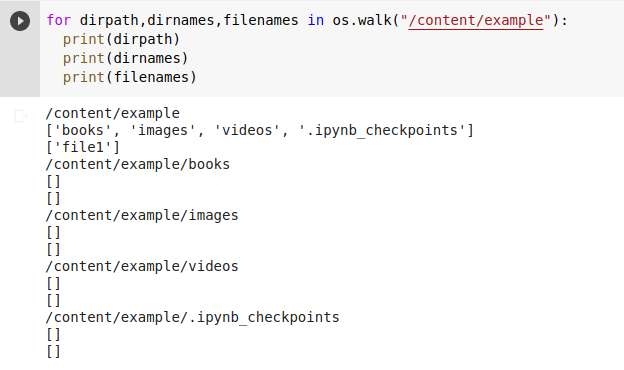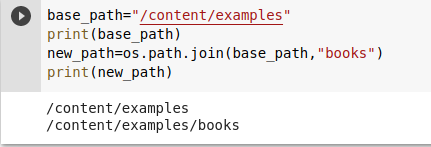This article was published as part of the Data Science Blogathon.
Introduction
underlying operating system functionalities. The python module makes this possible, provides us with a means to interact with the underlying operating system in many different ways and provides us with a portable way to use operating system dependent functionalities.
For instance, allows us to obtain the path of the directory with which we are working, get the names of all files and folders within a directory, create a new directory or delete an existing one, etc.
In this blog, let's explore some useful methods in the operating system module that may come in handy when working on your next project.
Before starting, Let's see some of the things to keep in mind about the operating system module
The layout of all Python modules that depend on the embedded operating system is such that, provided the same functionality is available, the same interface is used.
Extensions specific to a particular operating system are also available through the operating system module, but its use is inevitably a threat to portability.
All functions that accept file names or paths accept both bytes and string objects as input, and if a filename or path is returned, the result is also an object of the same type.
All functions in thand python the module raises the OSError (or subclasses thereof) when invalid or inaccessible file names and paths are found, or other arguments that have the correct type, but they are not accepted by the operating system.
Let's start by importing the module.

Now let's go over the methods one by one.
1. os.name :
Gives the name of the module depending on the imported operating system

2. the.error :
It is the environment error class for E / S and OSError. It is generated when any function returns some error related to the system.
3. os.uname () :
Provides information about the system-dependent version.
4. os.ctermid):
This method returns the file name corresponding to the process control terminal.

5. os.environ :
It is a mapping object that represents the strings environment. This mapping is captured when the operating system module is initially imported and changes made to the environment thereafter are not reflected, except those made by directly modifying os.environ.
6. os.environb :
It is a mapping object that represents the environment as byte strings. In reality, It is the Bytes version of os.environ. os.environ and os.environb are synchronized. It is available if and only if supports_bytes_environ is True.
7. os.getenv (key, default = None) :
This method returns the key value of the variableIn statistics and mathematics, a "variable" is a symbol that represents a value that can change or vary. There are different types of variables, and qualitative, that describe non-numerical characteristics, and quantitative, representing numerical quantities. Variables are fundamental in experiments and studies, since they allow the analysis of relationships and patterns between different elements, facilitating the understanding of complex phenomena.... of environment if it exists and if it does not exist, the default value is returned.
8. os.getcwd () :
This method returns the location of the current working directory (CWD). The CWD is the folder in which the Python script operates.

9. os.listdir () :
This method returns a list of all files and folders present within the specified directory. If no directory is specified, the list of files and folders within the CWD is returned.

10. os.chdir () :
Used to change the CWD. Change CWD to the specified path.

11. os.mkdir () :
This method creates a new directory according to the specified path. In case the specified directory already exists, a FileExistsError is generated.
12. the.makedirs () :
This method recursively creates a directory. It means that when creating a leaf directory, if any of the intermediate level directories specified in the path are missing, the method creates them all.
13. removes () :
This method removes a file path. You cannot delete a directory. In case the specified path is that of a directory, OSError is generated.
14. os.rmdir () :
This method is used to delete an empty directory. If the path does not correspond to an empty directory, OSError is generated.
15. os.walk () :
This method generates the file names in a directory tree by traversing the tree from top to bottom or from bottom to top. os.walk returns a generator that creates a tuple of values (directory path, directory names, file names)

sixteen. os.path.join () :
This method joins multiple components of the path with exactly one directory separator (“/”) after each non-empty part, except the last component of the path. If the last component of the path is empty, a directory separator is placed (“/”) in the end. This method returns a string with the concatenated path.

17. os.path.basename () :
This method is used to get the base name in a specified path. The method returns a string value representing the base name of the specified path.

18. os.path.split () :
This method splits the path name into a head and tail pair. Here, the tail is the last component of the pathname and the head is everything that comes before. The method returns a tuple from the beginning and end of the specified path.

19. os.path.dirname () :
This method returns the directory name from the provided path.

20. os.path.commonprefix () :
This method returns the longest path prefix, which is a prefix for all routes in the specified list.

21. os.path.getmtime () :
This method returns the time of the last modification of the route.

22. os.path.getatime () :
This method returns the time of the last access to the path.

23. os.path.getctime () :
This method returns the ctime, what is the time of the last change (Unix) or creation time (Windows) according to the system.

24. os.path.abspath () :
This method returns a normalized absolute version of the specified path.
25. os.path.normpath () :
This method normalizes the specified path name by collapsing redundant separators and top-level references.

26. os.path.normcase () :
This method normalizes the case of the specified path name.
27. os.path.isfile () :
This method checks if the specified path corresponds to an existing file or not. This method returns a boolean value.

28. os.path.isdir () :
This method checks and reports if the specified path corresponds to an existing directory or not. The method returns a boolean value.

29. os.path.isabs () :
This method specifies whether the given path is absolute or not.

30. os.path.exists () :
This method returns True for existing routes. Returns False for broken symbolic links.

The media shown in this article is not the property of DataPeaker and is used at the author's discretion.






